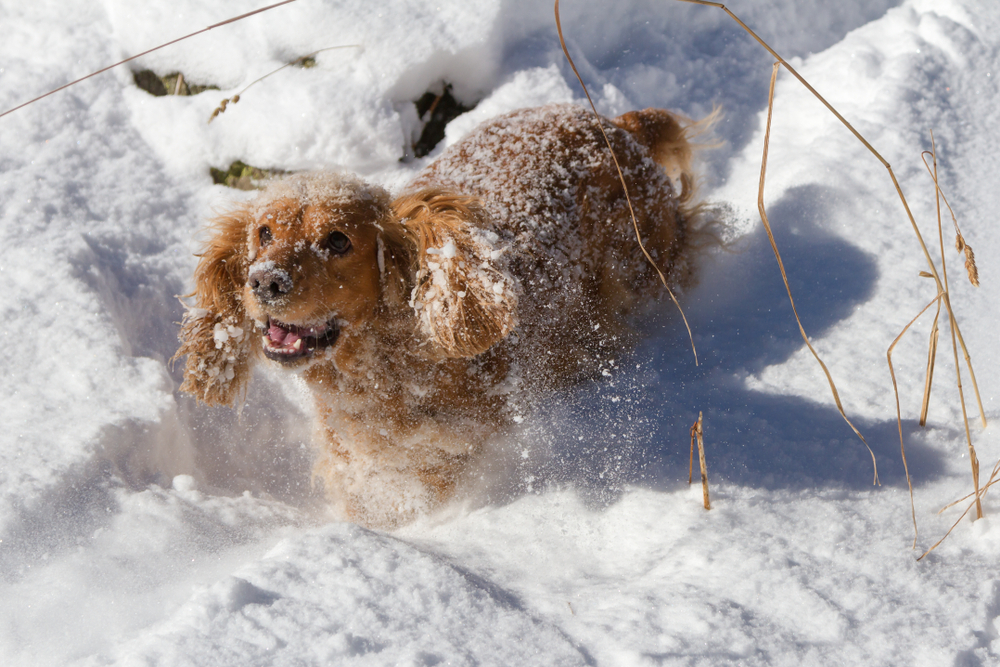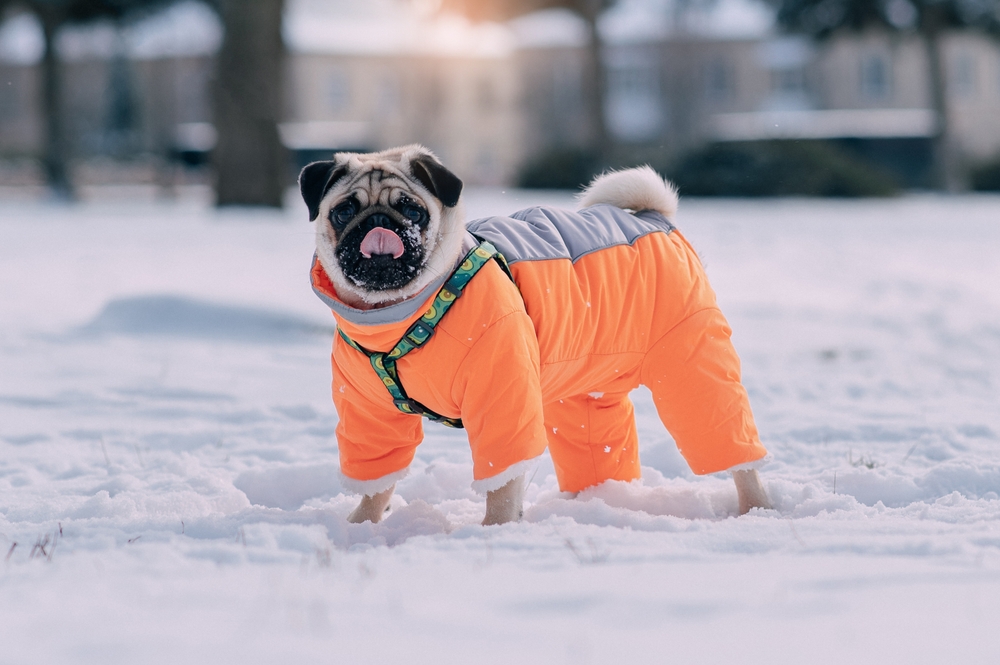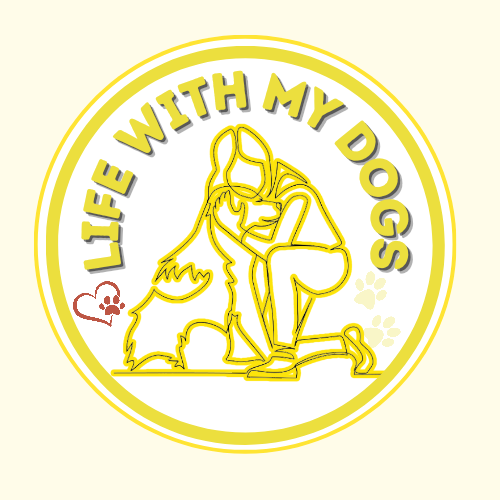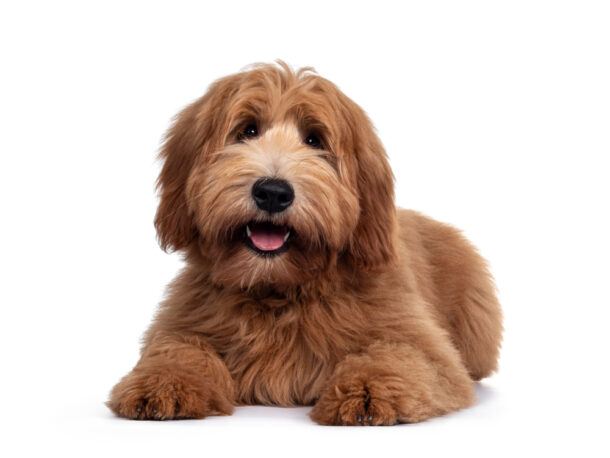LifeWithMyDogs is supported by our audience. When you purchase through one of our links, we may earn a small affiliate commission. As an Amazon Associate I earn from qualifying purchases. Your cost is not affected.
**********
Those living in colder climates usually wear winter clothing. Growing up, I lived in western New York State. Everyone there kept snow boots, winter coats, warm hats, and gloves. Even all bundled, we often felt the cold. Knowing the potential winter dog hazards helped us keep our dogs safe and happy. Some of the issues that dogs face in the winter months might surprise pet owners. But knowing them is essential!

Some dogs love to play in the snow!
Winter Dog Hazards
We all need protective gear in winter to stay safe from the harm of de-icing salt on the sidewalks. Dogs are also sensitive creatures like us; therefore, they also need safety and protective coverings. Apart from the obvious cold and low-temperature danger, there are some other winter dog hazards as well that many dog owners are unaware of.
This post is for you if you are also a dog owner. Keep reading to find out the potential winter dog hazards.
Major Winter Dog Hazards to Consider
Antifreeze
My Dad’s garage always had antifreeze stored within. In the north, you need it. But Dad kept it safely covered and away from our pets. He quickly and safely discarded the empty containers, too.
We knew that one of the most dangerous hazards to dogs in winter is antifreeze. It starts with damaging the dog’s kidneys and other organs and ultimately causes death. Licking antifreeze in even small amounts can be very dangerous to dogs. Since antifreeze smells and tastes sweet, dogs get easily attracted to it.
If you notice that your dog has walked through the antifreeze, wash away his paws and body immediately. However, if your dog has licked the antifreeze, you should immediately contact your veterinarian. The sooner he is treated, the better it is for your dog’s health. WSU.edu notes that the health consequences become quickly serious and even deadly.
Dogs won’t ever go and open the antifreeze bottle; rather, they come across antifreeze when it is leaking from a car’s radiator or in an open container. So it is necessary to check your car for any leaks and keep your dog away from your vehicle. Be sure to clean up any spills and discard empty containers quickly.
Freezing temperatures
Coated dogs like collies, huskies, and sheepdogs withstand cold temperatures longer. But dog breeds with short hair coats, like Boxers, Great Danes, Dobermans, etc., feel cold when the temperature starts dropping. As these dogs get older, the cold affects them even more. They can easily catch hypothermia if they’re exposed to freezing temperatures for a long time. They feel cold, the same as humans. Pets.webmd offers this helpful guide to explain how cold affects our pets.
Make sure to read more about the dog breed you have and make the preparations for the winter accordingly. If you typically take your dog out for exercise, it will be completely fine without a coat. However, if you intend to let him outside for longer times, then get a coat for your pet. Remember that some dog breeds are used to living in cold temperatures, so you don’t have to make any extra preparations for their comfort.
This is one where often the size and type of dogs make a big difference. My sister’s long-haired St Bernard needed no coat. He played in the snow for hours and sometimes joined in our snowman building. My rough-coated collie enjoyed the snow, too. But my Whippet would have none of that cold. She dutifully ran outside when she needed, then darted back inside as soon as she could. We kept a quilted coat for her during the very cold times. Whippets just don’t have that natural cold insulation that my collie had.
Lakes
Lakes and ponds get frozen in winter due to the dropping temperature. Though the sight is extremely pleasing to our eyes, it poses a potential hazard for your pet. The ice could be very sharp, which can easily cut your dog’s paws. Since ice is slippery, dogs can easily slip on it, thereby hurting themselves. Walking on ice also brings the risk of hypothermia and several other problems. Therefore, avoiding such places and walking with your mate in other safe spaces is better.
Also, there can be hidden thin spots and holes in the ice, which you might be unaware of. Your dog can fall into it. If such a situation has occurred, you should never go behind chasing your dog. Don’t step on the ice as it can break with your weight too. Always look for help. You can use a stick or leash for your dog so that he can hold on and get back safely. Also, try calling his name so he can listen and come back to you.
Stories such as this recent one of a dog rescued from a lake tell how serious ice and lakes is for our pets. It seems that most winters some pets fall into icy waters. This video shows such an incredible rescue. A crew of firefighters came to this dog’s rescue from an icy lake, saving him from certain death.
Christmas Decorations
We can write down a long list of Christmas decorations that can be a potential hazard to your dog. Not only the decorations but various food items can also be harmful to your dog. This can include nuts, chocolates, and some cakes. Some ingredients present in these items can be deadly to your dogs. Therefore, always ensure that all the food items are kept away from your dog.
As far as the decoration items are concerned, the Christmas tree can be the biggest hazard as the pets can try climbing on it. As the tree cannot bear a dog’s weight, both the tree and the dog can fall down, thereby getting injured. The best idea is to keep the tree in a safe place in a room and limit your pets’ access to that room.
Glass baubles are the most dangerous kind of Christmas decorations. Pets, especially dogs, try to chew anything that fascinates them. Chewing on baubles can not only injure their mouth, but also it can cause intestinal blockages. The same is the case with fairy lights. Fairy lights that are hung all around the house can tangle up the dogs or any other pets at home. This causes the animal to panic and might injure them.
There can also be some edible decorations, which would obviously be of great interest to animals. They can contain harmful ingredients, which would be toxic if swallowed. Therefore, you must be extra careful with Christmas decorations if you have pets at home. Plan everything beforehand and keep the dogs away from decorative items.
De-icing Salts
The de-icing salt contains toxic chemicals which harm your dog. It is very common in the areas where it snows a lot; you will find it around the driveways, where the intention is to melt the ice.
I had a very sad experience with this at a local 4H show. The show grounds was shared with the horse exhibitors, and they had covered the entire area with de-icer. None of the dog exhibitors knew about that. As a result, several dogs ended up with chemical burn paw wounds that took several weeks of careful care to heal. Since that day, we always check the area for any potential caustic or poisonous substances.
Licking small amounts of de-icing salt may cause no serious issues or clinical toxication. However, if your dog has ingested it in large amounts, then salt toxicity can occur. Excess thirst indicates that your dog has ingested large amounts of de-icing salt. Along with that, it can also cause lethargy, vomiting, and diarrhea.
Apart from licking de-icing salt from the driveways, it can also accumulate in its paws, which the dog may lick. This will ultimately lead to poisoning. The toxins in de-icing salt are so harsh that they can even burn your dog’s paws.
Dark Presents Winter Dog Hazards
Winters are dark and gloomy. The night draws in quite earlier compared to summer. Considering this, the chances of road traffic accidents are higher in winter than in any other season.
Therefore, always take precautions before leaving your home with your dog. Purchase reflective collars and leashes for your dog. Wear reflective clothing and ensure that your dog bears reflective stuff as well. Always let your dog wear ID tags on its neck with your address so that it can be returned to your home if the dog gets lost.
Also, note that many predators roam not just at night but also at dusk and dawn. While most will avoid you and your pet, some may not. Stay alert to protect yourself and your beloved pet!
Rodent Poisons
To find warmth and comfort, the rodent will be more indoors, where there are abundant food supplies. So you will come across more rodents in your kitchen during winter. In these times, rodent poisons are more commonly used than in the other seasons.
However, you need to be aware of rodent poison risk to your pet. The rodent poisons contain various ingredients which can harm your pets as well. So if your pet has ingested the poison, make sure you keep its packaging to show the veterinarian. This will help him find out what kind of poison your dog has ingested and what can be done to counter its effects.
The symptoms appearing after ingesting the rodent poison can vary depending on its ingredients. It may cause brain swelling, kidney failure, and internal bleeding. Therefore, make sure you place the rodent poisons in a safe place where your pet cannot reach them. Better yet, choose a more pet-safe option such as these humane traps for rodents.
Of course, the best way remains keeping the area closed from rodents and other pests. While this might be challenging in some areas, it does help keep our pets safe from other diseases and infections, too. For instance, leptospirosis often is spread by rodents to our pets.

warm coats help prevent winter dog hazards
Ways to Protect Against Winter Dog Hazards
Now that you have a clear idea of what can be potential hazards for your dog in winter, you should also be aware of what can be done to protect them. Here is what you can do to keep your dogs protected in winter:
1. Remove or Safely Store all the Chemicals and Poisons
Pick all the coolants and antifreeze from around your house and keep them stored in a locked cabinet. Allow no such harmful chemicals accessible to pets. Dogs love sniffing and trying every new thing; you must keep every hazardous thing away from them.
2. Cover Up
Every day you come home from outside and wipe down the paws and body of your dog so they cannot lick the de-icing salt stick to their paws. Licking de-icing salt irritates their mouths. Also, for the short-haired dog, get some comfortable sweaters, as they cannot bear the cold like humans.
3. Provide the Shelter
You can freely leave the dogs outside to roam in a fenced-in yard in the summer, usually with shade available. Of course, summer heat poses a problem at times, too. But this shouldn’t be done during the winter seasons. Keep them indoors with yourself all the time. Nevertheless, dogs love walking and exercising. Therefore, you should take them with you with full coverage and precautionary measures.
Preventing Winter Dog Hazards
Being a pet parent means you must carefully consider even the smallest things at home. Beware of the chemicals and decorative stuff that would otherwise injure your pet. As the winters set in, dog hazards can significantly increase. Take care of all the ice kind of stuff, and always take precautionary measures when going outside with your dog.
In case of any emergency, contact your veterinarian right away. At the same time, try to find out what your dog has ingested so that it will be easier for the vet to treat it.
Other Articles of Interest

